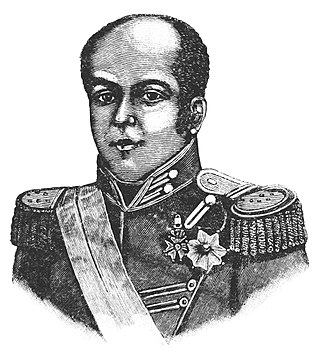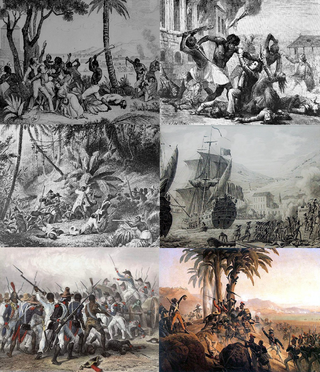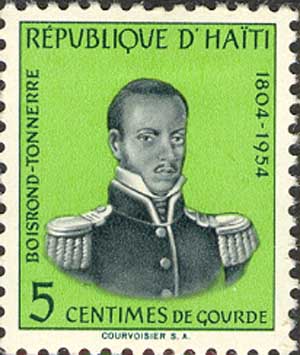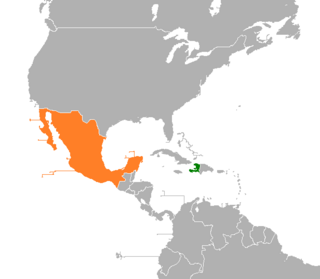Christophe Philippe Charles (born 1951) is a Haitian poet. Born in Port-au-Prince, Charles received a philosophy degree from the University of Haiti. One of his best-known poems is Désastre (1975).
Christophe Philippe Charles (born 1951) is a Haitian poet. Born in Port-au-Prince, Charles received a philosophy degree from the University of Haiti. One of his best-known poems is Désastre (1975).

Haiti, officially the Republic of Haiti, and formerly known as Hayti, is a country located on the island of Hispaniola in the Greater Antilles archipelago of the Caribbean Sea, east of Cuba and Jamaica, and south of The Bahamas and the Turks and Caicos Islands. It occupies the western three-eighths of the island which it shares with the Dominican Republic. To its south-west lies the small Navassa Island, which is claimed by Haiti but is disputed as a United States territory under federal administration. Haiti is 27,750 km2 (10,714 sq mi) in size, the third largest country in the Caribbean by area, and has an estimated population of 11.4 million, making it the most populous country in the Caribbean. The capital is Port-au-Prince.

Port-au-Prince is the capital and most populous city of Haiti. The city's population was estimated at 1,200,000 in 2022 with the metropolitan area estimated at a population of 2,618,894. The metropolitan area is defined by the IHSI as including the communes of Port-au-Prince, Delmas, Cite Soleil, Tabarre, Carrefour and Pétion-Ville.

Faustin-Élie Soulouque was a Haitian politician and military commander who served as President of Haiti from 1847 to 1849 and Emperor of Haiti from 1849 to 1859.

Cap-Haïtien, typically spelled Cape Haitien in English and often locally referred to as Le Cap or Au Cap, is a commune of about 190,000 people on the north coast of Haiti and capital of the department of Nord. Previously named Cap‑Français and Cap‑Henri during the rule of Henri I, it was historically nicknamed the Paris of the Antilles, because of its wealth and sophistication, expressed through its architecture and artistic life. It was an important city during the colonial period, serving as the capital of the French Colony of Saint-Domingue from the city's formal foundation in 1711 until 1770 when the capital was moved to Port-au-Prince. After the Haitian Revolution, it became the capital of the Kingdom of Haiti under King Henri I until 1820.

The Haitian Revolution was a successful insurrection by self-liberated slaves against French colonial rule in Saint-Domingue, now the sovereign state of Haiti. The revolt began on 22 August 1791, and ended in 1804 with the former colony's independence. It involved black, biracial, French, Spanish, British, and Polish participants—with the ex-slave Toussaint Louverture emerging as Haiti's most prominent general. The revolution was the only slave uprising that led to the founding of a state which was both free from slavery and ruled by non-whites and former captives. The successful revolution was a defining moment in the history of the Atlantic World and the revolution's effects on the institution of slavery were felt throughout the Americas. The end of French rule and the abolition of slavery in the former colony was followed by a successful defense of the freedoms the former slaves had won, and with the collaboration of already free people of color, of their independence from white Europeans.
Charles-Henri Jean-Marie Baker is a Haitian industrialist and presidential candidate. He is a former member of the Group of 184. Baker was a candidate for president in Haiti's 2006 and 2010 elections.

Charles Rivière-Hérard also known as Charles Hérard aîné was an officer in the Haitian Army under Alexandre Pétion during his struggles against Henri Christophe. He was declared President of Haiti on 4 April 1843. He was forced from office by revolutionaries on 3 May 1844.

The National Assembly consisted of the bicameral legislature of the Republic of Haiti, consisting of the upper house as the Senate (Sénat) and the lower house as the Chamber of Deputies. Both assemblies conduct legislative sessions at the Haitian capital of Port-au-Prince.
Croix-des-Bouquets is a commune in the Ouest department of Haiti. It is located 12.9 kilometers (8.0 mi) to the northeast of Haiti's capital city, Port-au-Prince. Originally located on the shore, it was relocated inland after the 1770 Port-au-Prince earthquake.

Louis Félix Mathurin Boisrond-Tonnerre, better known as simply Boisrond-Tonnerre, was a Haitian writer and historian who is best known for having served as Jean-Jacques Dessalines' secretary. Boisrond-Tonnerre was educated in Paris until 1798 when he returned to Haiti. He is the author of the 1804 Independence Act of Haiti, which formally declared Haiti's independence from the colonial rule of France. He is also known for his work chronicling the Haitian Revolution, Mémoires pour Servir à l'Histoire d'Haïti.
Gesner Abelard was a Haitian painter and sculptor. Born in Port-au-Prince, Abelard began life as a mechanic, then studied painting and sculpture at the Industrial School of Port-au-Prince under the painter Humberman Charles. He became a member of the Haitian Centre d'Art in 1948. In 1949, he received a bronze medal at the International Exposition celebrating the bicentennial of Port-au-Prince. Many of his paintings depict birds, trees and scenes of Haitian life, and he is considered a naïve artist. Abelard is believed to be deceased.
Haitian art is a complex tradition, reflecting African roots with strong Indigenous, American and European aesthetic and religious influences. It is an important representation of Haitian culture and history.

The National Palace was the official residence of the President of Haiti, located in Port-au-Prince, facing Place L'Ouverture near the Champs de Mars. It was severely damaged during a devastating earthquake in 2010. The ruins of the building were demolished in 2012 under the Martelly administration, and plans to rebuild the palace were announced by then president Jovenel Moïse in 2017.

The Enriquillo–Plantain Garden fault zone is a system of active coaxial left lateral-moving strike slip faults which runs along the southern side of the island of Hispaniola, where Haiti and the Dominican Republic are located. The EPGFZ is named for Lake Enriquillo in the Dominican Republic where the fault zone emerges, and extends across the southern portion of Hispaniola through the Caribbean to the region of the Plantain Garden River in Jamaica.

A catastrophic magnitude 7.0 Mw earthquake struck Haiti at 16:53 local time on Tuesday, 12 January 2010. The epicenter was near the town of Léogâne, Ouest department, approximately 25 kilometres (16 mi) west of Port-au-Prince, Haiti's capital.
Football is the most popular sport in Haiti. It is run by the Fédération Haïtienne de Football. The association administers the national football team, as well as the national football league. Football in Haiti first developed in the state capital of Port-au-Prince, where a regional championship round was already held for the first time in 1912.

Football Inter Club Association; is a professional football club based in Cap-Haïtien, Haiti.

Charles Hérold Jr. is a Haitian footballer who plays as a right winger for Cibao FC in the Liga Dominicana de Fútbol.

Haiti–Mexico relations are the diplomatic relations between Haiti and Mexico. Both nations are members of Association of Caribbean States, Community of Latin American and Caribbean States, Organization of American States and the United Nations.

Protests began in cities throughout Haiti on 7 July 2018 in response to increased fuel prices. Over time, these protests evolved into demands for the resignation of Jovenel Moïse, the then-president of Haiti. Led by opposition politician Jean-Charles Moïse, protesters stated that their goal to create a transitional government, provide social programs, and prosecute allegedly corrupt officials. Throughout 2019, 2020, and 2021, hundreds of thousands took part in protests calling for the government to resign. On 7 February 2021, supporters of the opposition against the then-incumbent Jovenel Moïse allegedly attempted a coup d'état, leading to 23 arrests, as well as clashes between protestors and police.